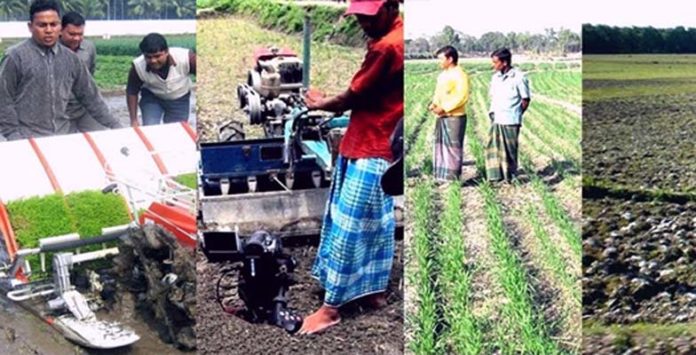RANGPUR, Nov 27, 2018 (BSS) – The splendid success achieved in adapting
to climate change in last ten years, the country’s agriculture sector is
gradually taking a sustainable shape and increasing food production
constantly.
Agriculture experts said Bangladesh is moving toward the right direction
to achieve agricultural sustainability increasing overall food production by
overcoming all sorts of constraints, including adverse impacts of climate
change.
“Agriculture scientists are conducting continuous research for
innovation and expanded cultivation of climate resilient crop varieties. So,
profitable cropping patterns are becoming effective to increase food
productivity,” said Dr Md Abdul Mazid.
Dr Mazid, an agriculture scientist, who got the Independence Award 2018
Medal (food security) this year, appreciated pragmatic steps taken by the
government during previous years to increase food productivity by adapting to
changing climate.
Expanded cultivation of climate smart crops, mechanisation of
agriculture, adoption of proven technologies, best farm practices, balanced
fertilisation and pest control and expansion of irrigation facilities are
contributing to boost food output.
He suggested all agriculture related research institutes and
organisations for conducting continuous research on innovation of time-
befitting, need-based and more climate smart high yielding varieties of crops
to further increase food productivity.
“Bangladesh is currently producing over 34.8 million tonnes of clean
rice annually in addition other cereal crops making the country self-reliant
on food for its 16 crore population to attain the sustainable development
goals by 2030,” he said.
The growth in rice production will continue to increase following
various pragmatic steps of the government to further enhance its output by
almost one and a half times by 2050 to feed probable 22-crore population that
time.
Dr Mazid, also a former Chief Scientific Officer of Bangladesh Rice
Research Institute, said farmers have started using improved and eco-friendly
agriculture technologies and practices almost having no adverse effects on
the environment.
“For a sustainable agriculture amid changing climate, we have to ensure
effective extension of services, improved technologies and proven practices
among farmers using video-based training to resolve agricultural and natural
resource problems,” he said.
Dr Mazid especially suggested for adoption of resource-conserving and
conservation agriculture technologies, practices, integrated pest and
nutrient managements, reduced tillage and agro-forestry for sustainable
agriculture.
“Reaching quality seed of high yielding crops and transferring
technologies for seed production of hybrid crops to farmers’ level along with
providing necessary ICT-based training on latest technologies are crucial to
increase food productivity,” he said.
Echoing the same tone, Horticulture Specialist at the Department of
Agriculture Extension (DAE) at its regional office here Khondker Md Mesbahul
said food production continues increasing consistently, especially in the
last one decade.
Like areas on the country, farmers produced 34.22-lakh tonnes of rice
and wheat in five districts of Rangpur region during the 2016-2017 seasons
against 18.90-lakh tonnes food demand of 1.61-crore population with 15.32-
lakh tonnes surplus food.
“However, farmers produced only 29.40-lakh tonnes rice and wheat during
the 2008-2009 seasons against 17.26-lakh tonnes food demand of 1.04-crore
population then with 12.14-lakh tonnes surplus food in the region,” Islam
added.
Talking to BSS, Deputy Director of the DAE at its regional office Md
Moniruzzaman said food productivity would continue to increase as farmers
started using quality seed of climate smart crops, compost fertilisers and
latest technologies in crop cultivation.
“The country will attain sustainability in agriculture soon as crop
intensity stood at 230.57 percent during the 2016-2017 against 214 percent in
the 2008-2009 seasons and the trend continues in Rangpur agriculture region
as elsewhere in the country,” he said.



